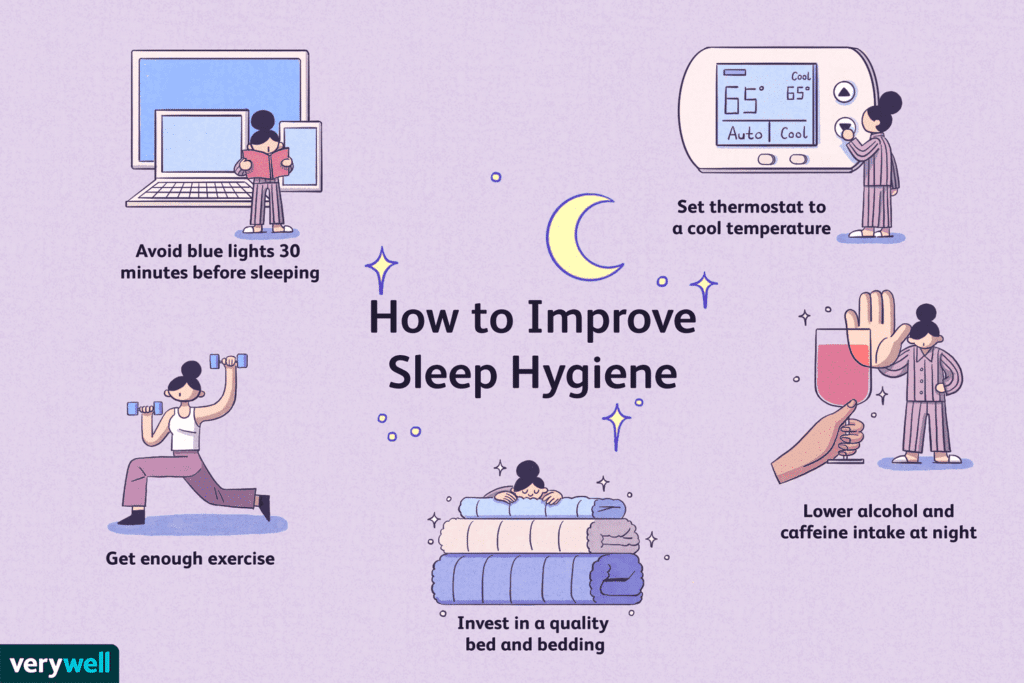
In our modern world, where hustle culture often reigns supreme, sleep is sacrificed in favor of productivity and entertainment. Yet science says this comes at a great cost: far from some passive state of nonconsciousness, sleep is an active process, critically linked with every layer of life, touching our health, our emotions, and even our greatness. Prioritizing better rest can considerably improve your quality of life, yielding benefits far beyond those of just feeling less tired.
The Purpose of Sleep
Sleep is not a matter of quiescence but an intensely biologically active stage; nurture is imparted both to body and brain in ways that are important. Cells are repaired during sleep, tissues rejuvenated, and the immune system strengthened. In the process, the brain organizes and restores itself: it consolidates memories, processes information, and even clears toxins.
This nighttime habit also balances hormonal levels. Sleep regulates the hormones responsible for our sleeping and wakeful state, such as melatonin, and growth hormone responsible for tissue repair. Lack of sleep has inconvenienced their act of maintaining these cycles. The cycle results in fatigue, irritability, or, on a long-term note, chronic diseases like heart disease, diabetes, and weakened immunity.
Understanding Sleep Cycles
Sleep does not come in a single, homogeneous block. Rather, it is cyclical, averaging about 90-minute periods. It is further divided into four stages:
- Light Sleep (NREM Stage 1): When transitioning from wakefulness to sleep, the brain waves slow down.
- Mild Sleep: During NREM Stage 2, the brain waves slow further, the body temperature drops, and the heart rate decreases.
- Deep Sleep: In this stage, NREM Stage 3, the focus will be on physical recovery, especially in the areas of strengthening the immune system and cellular repair.
- REM Sleep: This is the stage of active sleep when most vivid dreams occur; it is also during this time when the brain, active and processing emotions, sets and cements cognitive skills.
Each one of these stages has a different function in order to restore both the body and the mind. It is very important to get a number of full sleep cycles for overall health and functioning capacity.
How Sleep Improves Your Lifestyle
The transformative power of sleep extends beyond basic health benefits. It directly influences how we experience and navigate life:

Sharper Focus and Productivity
The brain that has enough rest works most effectively. All tasks requiring a lot of creativity, problem-solving ability, or a decision require much less energy, and memory and concentration will increase noticeably.
Emotional Resilience
Sleep is an emotional regulator. When one fails to get sleep, stress levels increase, paving the way to anxiety and depression. Sufficient rest, on the other hand, implants tranquility and increases emotional intelligence, hence improving interpersonal relations.
Improved Physical Health
Good sleeping has an overwhelming effect on how our body fights against diseases. It helps lower the risk of obesity, serious heart conditions, and metabolic disorders because it allows hormonal balance and acts in support of the immune system.
Enhanced Relationships
When well-rested, people are much more patient, understanding, and socially interactive; thus, family and other relationships benefit both at home and in the community.
Barriers to Quality Sleep
Despite this, many find quality sleep so hard to achieve. Accustomed screen use before bedtime messes up the sleeping pattern, and next is the irregular sleep schedule. Added to these factors are the environmental ones, including noise, light, and a generally uncomfortable sleeping space.
Practical Steps towards Better Sleeping
Here is how you can take back your sleep with the following actionable tips:
- Stick to a Sleep Schedule: A consistent bedtime and wake-up time help the body develop the right rhythm. Better Sleep-Environmental Sleep
- Optimization: Make sure your bedroom is dark, quiet, and cool. If necessary, create such potential with blackout curtains or a white noise machine. Screen
- Time Limitation: The blue light emitted by phones and laptops interferes with melatonin production; hence, it is better to avoid screens for at least an hour before going to sleep.
- Practice relaxation techniques: Meditation, reading a book, or deep breathing exercises can help clear your mind before sleep.
- Watch your diet and exercise: Avoid caffeine and heavy meals close to bedtime; continue your usual daytime physical activity.
The Ripple Effect of Better Rest
Better sleep realizes a positive trickle effect throughout the different areas of your life: you are more energetic in the morning, deal with stress in a more appropriate manner, and confront your challenges with acuity and gifts of focus. Your growing body is stronger, and your mind grows sharper, your emotional resilience more resilient. In a world that prizes busyness above all else, choosing rest can seem a rather radical act. But it is one of the most powerful things you can do on behalf of your health and the quality of your life. By embracing the science of sleep and taking some simple steps to improve your rest, you can transform your nights-and your days-for the better. Tonight, let sleep be a priority in its rightful place. It’s more than an escape from the day; it’s fundamental to a healthier, happier life.




